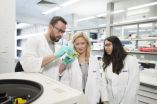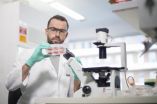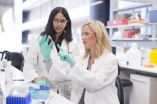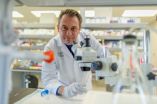(Press-News.org) Melbourne researchers have revealed the critical importance of highly specialised immune cells, called natural killer cells, in killing melanoma cells that have spread to the lungs.
These natural killer cells could be harnessed to hunt down and kill cancers that have spread in the body.
The team, from the Walter and Eliza Hall Institute, also found natural killer cells were critical to the body's rejection of donor bone marrow transplants and in the runaway immune response during toxic shock syndrome.
The discoveries came after the team showed that a protein called MCL-1 was crucial for survival of natural killer cells, in research published today in the journal Nature Communications. The discovery will help to determine how natural killer cells can be manipulated to fight cancers and other disorders.
Dr Nick Huntington, Dr Priyanka Sathe and Ms Rebecca Delconte from the Walter and Eliza Hall Institute said MCL-1 could be a target for boosting or depleting natural killer cell populations to treat disease. Natural killer cells are immune predators, scouring the body in search of foreign invaders such as viruses, and sensing changes in our own cells that are associated with cancer.
Dr Huntington said the team showed natural killer cells were needed to fight off invading tumour cells that had spread past the original cancer site.
"We discovered MCL-1 is absolutely essential for keeping natural killer cells alive," Dr Huntington said. "Without natural killer cells, the body was unable to destroy melanoma metastases that had spread throughout the body, and the cancers overwhelmed the lungs".
"Knowing how important natural killer cells are for detecting and destroying cancer cells as they spread suggests they would be a good target for boosting immune defenses to treat cancer."
Natural killer cells are present in high frequency in our blood and patrol the body's 'frontlines' – the lungs, intestines, mucous membranes and skin – to detect and destroy diseased cells. However these predatory natural killer cells are a double-edged sword.
Dr Huntington said the team showed natural killer cells also played a role in death from toxic shock (sepsis), and in rejecting bone marrow transplants.
"Natural killer cells led the response that caused rejection of donor stem cells in bone marrow transplantations," Dr Huntington said. "They also produced inflammatory signals that can result in toxic shock syndrome, a potentially fatal illness caused by bacterial toxins that causes a whole-body inflammatory reaction."
Dr Huntington said the discovery provided a solid lead to look for ways of boosting natural killer cells when they are needed in higher supply, or depleting them when they are causing illness.
"We showed MCL-1 levels inside the cell increase in response to a blood cell signalling protein called interleukin 15 (IL-15). We previously knew IL-15 boosted production and survival of natural killer cells, and we have shown that IL-15 does this by initiating a cascade of signals that tell the natural killer cell to produce MCL-1 to keep it alive."
"Now that we know the critical importance of MCL-1 in the survival of natural killer cells, we are investigating how we might manipulate this protein, or other proteins in the pathway, to treat disease," Dr Huntington said.
INFORMATION:
The research was supported by the Australian National Health and Medical Research Council, The Menzies Foundation and the Victorian Government.
Immune cell discovery could help to halt cancer spread
2014-08-14
ELSE PRESS RELEASES FROM THIS DATE:
Newborns' genetic code sends infection distress signal
2014-08-14
Babies suffering from life-threatening bacterial infections such as sepsis could benefit from improved treatment, thanks to a ground-breaking study.
For the first time, researchers have been able to detect and decode a signal generated from a baby's DNA that can tell doctors whether or not a bacterial infection is present in the bloodstream.
The findings could help develop a test for bacterial infection in newborns, using a single drop of blood.
Immediate detection of such infections, which are a major cause of death among young children, is currently impossible ...
Bypass commands from the brain to legs through a computer
2014-08-14
VIDEO:
The right arm muscles and the locomotion center of the man are artificially connected through a computer. His legs are in a relaxed state. When he moves his right hand,...
Click here for more information.
Gait disturbance in individuals with spinal cord injury is attributed to the interruption of neural pathways from brain to the spinal locomotor center, whereas neural circuits locate below and above the lesion maintain most of their functions. An artificial connection ...
Aspirin may slow recurrence in breast cancer patients
2014-08-14
SAN ANTONIO (August 14, 2014) — New findings published today in the journal Cancer Research reveal that some postmenopausal overweight breast cancer patients who use common anti-inflammatory drugs like aspirin or ibuprofen have significantly lower breast cancer recurrence rates.
Researchers from the Cancer Therapy & Research Center at The University of Texas Health Science Center at San Antonio and the University of Texas at Austin began by examining blood serum from CTRC breast cancer patients, said CTRC oncologist Andrew Brenner, M.D., Ph.D.
Studying Blood Serum
They ...
Protein found to block benefits of vitamin A cancer therapy
2014-08-14
Retinoic acid is a form of vitamin A that is used to treat and help prevent the recurrence of a variety of cancers, but for some patients the drug is not effective. The reason for this resistance was unclear until this week when researchers from Virginia Commonwealth University (VCU) Massey Cancer Center demonstrated that a protein known as AEG-1 blocks the effects of retinoic acid in leukemia and liver cancer. Because AEG-1 is overexpressed in nearly every cancer, these findings could impact the care of countless cancer patients.
Details of the study were published ...
Lionfish characteristics make them more 'terminator' than predator
2014-08-14
SACRAMENTO, Calif. – New research on the predatory nature of red lionfish, the invasive Pacific Ocean species that is decimating native fish populations in parts of the Caribbean Sea and Atlantic Ocean, seems to indicate that lionfish are not just a predator, but more like the "terminator" of movie fame.
The finding of behavior that was called "alarming" was presented today by Kurt Ingeman, a researcher from Oregon State University, at the annual meeting of the Ecological Society of America.
Most native predatory fish are attracted to prey when their numbers are high, ...
NSAIDs may lower breast cancer recurrence rate in overweight and obese women
2014-08-14
PHILADELPHIA — Recurrence of hormone-related breast cancer was cut by half in overweight and obese women who regularly used aspirin or other nonsteroidal anti-inflammatory drugs (NSAIDs), according to data published in Cancer Research, a journal of the American Association for Cancer Research.
"Our studies suggest that limiting inflammatory signaling may be an effective, less toxic approach to altering the cancer-promoting effects of obesity and improving patient response to hormone therapy," said Linda A. deGraffenried, PhD, associate professor of nutritional sciences ...
Mayo Clinic challenges some recommendations in updated cholesterol treatment guideline
2014-08-14
A Mayo Clinic task force challenges some recommendations in the updated guideline for cholesterol treatment unveiled by the American College of Cardiology (ACC) and American Heart Association (AHA) in 2013. The task force concludes, based on current evidence, that not all patients encouraged to take cholesterol-lowering medications, such as statins, may benefit from them and that the guideline missed some important conditions that might benefit from medication.
Furthermore, the task force believes an emphasis needs to be placed on an individualized treatment approach ...
NSAIDs benefit overweight breast cancer patients, study finds
2014-08-14
AUSTIN, Texas — Researchers have determined that postmenopausal overweight or obese breast cancer patients receiving hormone therapy as part of their treatment and who use nonsteroidal anti-inflammatory drugs (NSAIDs) such as aspirin or ibuprofen have significantly lower breast cancer recurrence rates and a sizable delay in time to cancer recurrence.
The findings, published in the Aug. 14 edition of Cancer Research, suggest a new possibility for reducing the incidence of breast cancer recurrence among overweight and obese postmenopausal women, who have a comparatively ...
Scientists make major breakthrough in understanding leukemia
2014-08-14
Scientists from Queen Mary University of London (QMUL) have discovered mutations in genes that lead to childhood leukaemia of the acute lymphoblastic type – the most common childhood cancer in the world.
The study was conducted amongst children with Down's syndrome – who are 20-50 times more prone to childhood leukaemias than other children – and involved analysing the DNA sequence of patients at different stages of leukaemia.
The researchers uncovered that two key genes (called RAS and JAK) can mutate to turn normal blood cells into cancer cells. However, these ...
Can our computers continue to get smaller and more powerful?
2014-08-13
From their origins in the 1940s as sequestered, room-sized machines designed for military and scientific use, computers have made a rapid march into the mainstream, radically transforming industry, commerce, entertainment and governance while shrinking to become ubiquitous handheld portals to the world.
This progress has been driven by the industry's ability to continually innovate techniques for packing increasing amounts of computational circuitry into smaller and denser microchips. But with miniature computer processors now containing millions of closely-packed transistor ...







